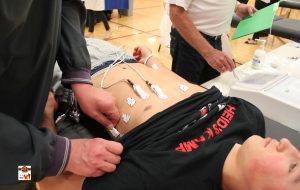EKG screenings at schools help find undetected heart problems in teens
Cathy Janek for Chronicle Media — October 18, 2016 Will Platou was a senior at Naperville North High School and like many of his classmates signed up for the Young Hearts for Life electrocardiogram screening when the program came to his school last fall.
Will Platou was a senior at Naperville North High School and like many of his classmates signed up for the Young Hearts for Life electrocardiogram screening when the program came to his school last fall.
A volunteer at the event, Will’s mom, Debbie Platou, recalls having lunch with the founder and director of the Young Hearts for Life program, Dr. Joseph Marek.
At lunch, she asked Marek how often students’ screenings are found to be abnormal.
Marek told Platou that at each screening about one percent of the population tested has an abnormal electrocardiogram.
Having screened about 3,000 students at Naperville North that year, Platou said three student’s EKGs were flagged including her son, now a freshman at the University of Kentucky.
“Will never had any symptoms,” said Debbie Platou, who also works in the healthcare field.
Her son was diagnosed with Wolff-Parkinson- White Syndrome (WPW).
Individuals with WPW have an extra electrical pathway between their heart’s upper chamber and lower chamber which causes a rapid heartbeat—a condition considered to be very rare.
The diagnosis led the family down a path of visiting specialists and additional testing. Will eventually had successful open heart surgery at Lurie Children’s Hospital in Chicago.
The surgery required Will to miss his last year of high school lacrosse, a sport he had played competitively since third grade, Debbie Platou said.
“We are so grateful to the organization, Will could have died on a lacrosse field,” Debbie Platou said.
Ten years ago Naperville North student Kathryn Bender died while waiting in the wings to perform with her dance group. Bender, a senior, had suffered from an undiagnosed heart rhythm disorder, Long QT Syndrome.
A foundation has created in her memory. The Kathryn Bender Memorial Foundation now helps out in numerous ways to provide financial assistance and support to scientific research and public education on heart rhythm disorders.
The group also provides support for Young Hearts for Life—the organization that saved Will Platou’s life.
In the United States, sudden cardiac death claims the lives of more than 60 young adults each week.
For the last 10 years, Marek has been determined to change those statistics.
Marek, a clinical cardiologist and senior medical director of cardiopulmonary service with Advocate Medical Group, founded Young Hearts for Life.
Today, the organization has performed heart screenings on more than 150,000 students.
Of that number, approximately 2,100 students have been identified as “at risk.”
Through further follow-up, hundreds of the “at risk” students were found to have life threatening conditions, including Hypertrophic Cardiomyopathy, Long QT Syndrome, Wolff-Parkinson- White Syndrome (WPW), Brugada Syndrome, and Arrhythmogenic Right Ventricular Dysplasia.
These conditions can be found in a student who is an elite athlete as well as kids who don’t exercise regularly, Dr. Marek.
From now through May, Young Hearts for Life will travel throughout the Chicagoland area visiting high schools and performing free EKG screenings on students.
Recently at Neuqua Valley High School, approximately 2,250 students took a break from gym classes to receive a free heart screenings.
Last year, 21 students required follow up testing and three of these students required surgery.
The following week, YH4L visited York High School in Elmhurst where 1,200 students were screened. This week, testing is scheduled at Oswego High School.
At each event, more than 200 community volunteers who have been trained on how to perform EKGs donate their time to help with the screenings.
Marek credits the support from volunteers with helping to make the program possible.
When Marek was piloting his program he used medical students, nurses, and EKG technicians as volunteers which was something that could not be “sustainable” on a larger scale.
Marek created a video course to train volunteers — many who are parents of students — to perform the test.
“It works like a charm,” Marek said. “The parents are efficient and the students are comfortable.”
Initially, local hospitals absorbed the entire cost for the program, Marek said, but as the program grew each high school funds the program in a variety of ways.
Some are still funded by hospitals, schools like Neuqua Valley are the funded through a cooperative effort between the Indian Prairie Educational Foundation and Healthy Driven Edward-Elmhurst Health.
— EKG screenings at schools help find undetected heart problems in teens –



